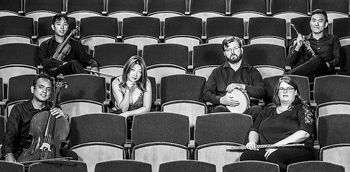by Nicholas Stevens

From the stage setup to the printed program, everything that greeted the entering audience foreshadowed a lively conclusion. The drum kit that sat unused on the stage for the first hour of the concert was indeed destined for use, and the shape of the program, from an opener for full ensemble to a series of smaller configurations then back again, provided a compelling journey for listeners.
On January 19 in Cleveland State University’s Drinko Recital Hall, the music of CSU associate professor of composition Greg D’Alessio dominated the program. In the first seconds of Sona Solo, a 2011 piece for flute, clarinet, violin, cello, piano, and percussion, D’Alessio’s expertise in writing for each instrument — and for the group as a whole — became obvious. Ars Futura brought lush sound and perfect balance to this meditative composition, which found percussionist Luke Rinderknecht stationed at the vibraphone throughout. Rinderknecht and flutist Madeline Lucas Tolliver traded off as conductors, and now and then the percussionist had to play while still beating time.
Veil, another D’Alessio composition, explores grief through a series of contrasting episodes. Scored for flute and string trio, it proved to be a standout on the program. The velvety murmur of Tolliver’s alto flute blended seamlessly with the strings in the opening section, which found the ensemble pulling unisons apart into wrenching discords. Cellist Daniel Pereira demonstrated an ability to switch from textural base to foreground at a moment’s notice, and violist William Bender rendered his solo with a meaty yet mournful sound. The ending — a tense harmony, repeated after what sounded like a final resolution — sent a clear message: grief can temporarily pass from conscious thought, but rarely if ever does it end.
Pianist and ensemble founder Shuai Wang gave a nuanced and powerful performance of CSU professor of composition Andrew Rindfleisch’s Reverie for solo piano. A meditation on the feeling of hearing J.S. Bach’s music, it shimmers with quasi-improvisatory diversions after segments of warm, familiar chord progressions.
D’Alessio’s Now’s the Time featured Wang alongside guest alto saxophone soloist John Perrine. The Coordinator of Jazz Studies and Chair of the Department of Music at CSU, Perrine brought the energy of an improviser to D’Alessio’s fully notated, two-movement suite.
Thread, another D’Alessio work, allowed Tolliver, Wang, and Pereira to shine together, though it would likely benefit from a trim in duration. End After End, the concluding piece on the program, brought the entire group back to the stage, and, in its second movement, spotlighted the theretofore unused drums and tam-tam. By the time the members of Ars Futura took their bow, they had realized the promise of their program.
Published on ClevelandClassical.com January 22, 2018.
Click here for a printable copy of this article



